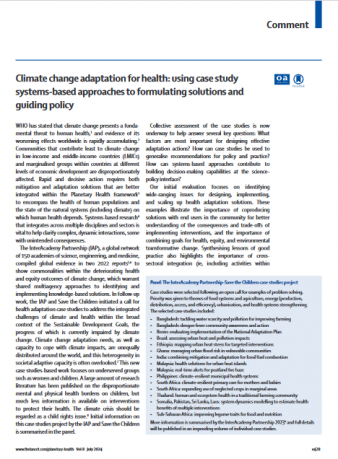WHO has stated that climate change presents a fundamental threat to human health,1 and evidence of its worsening effects worldwide is rapidly accumulating.2 Communities that contribute least to climate change in low-income and middle-income countries (LMICs) and marginalised groups within countries at different levels of economic development are disproportionately affected. Rapid and decisive action requires both mitigation and adaptation solutions that are better integrated within the Planetary Health framework3 to encompass the health of human populations and the state of the natural systems (including climate) on which human health depends. Systems-based research4 that integrates across multiple disciplines and sectors is vital to help clarify complex, dynamic interactions, some with unintended consequences.
This letter to The Lancet Planetary Health accompanies the book of case studies published by IAP. Read and download it here.
The InterAcademy Partnership (IAP), a global network of 150 academies of science, engineering and medicine, compiled global evidence in two 2022 reports5, 6 to show commonalities within the deteriorating health and equity outcomes of climate change, which warrant shared multiagency approaches to identifying and implementing knowledge-based solutions. In follow-up work, the IAP and Save the Children initiated a call for health adaptation case studies to address the integrated challenges of climate and health within the broad context of the Sustainable Development Goals, the progress of which is currently impaired by climate change. Climate change adaptation needs, as well as capacity to cope with climate impacts, are unequally distributed around the world, and this heterogeneity in societal adaptive capacity is often overlooked.7 This new case studies-based work focuses on underserved groups such as women and children. A large amount of research literature has been published on the disproportionate mental and physical health burdens on children, but much less information is available on interventions to protect their health. The climate crisis should be regarded as a child rights issue.8 Initial information on this case studies project by the IAP and Save the Children is summarised in the panel.
Read and download the publication on The Lancet website here.

